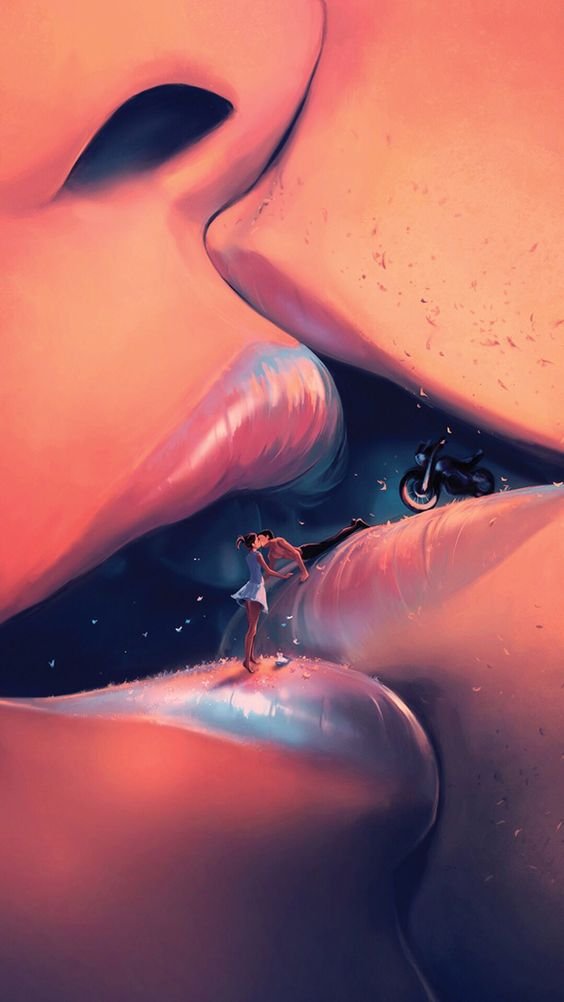What is love? (And what is not)
An article with art and interesting ... Enjoy.
Love is something that inspires and motivates all human beings, but it can also cause us much suffering when it is not reciprocated. That is why many movies, songs and even novels revolve around this theme (both love and lack of love).
Defining love is extremely complicated, because there are different types of love (depending on the intensity, depending on who we love, etc.). The truth is that this definition becomes an arduous task because love is socially influenced and there are many opinions and ways of approaching it.
Leaving aside other ways of loving (such as mother's love), in this article we will focus on what is true love and what is not, always from the concept of romantic love.

Research on love
Before going into the subject, it is necessary to review a series of scientific discoveries that, at least in the West, have helped us discover the great mystery of our brain's relationship with love and falling in love. Some results affirm that love and falling in love are fed by a series of behaviors, which help keep it alive.
But one of the most important findings of recent times is that love acts a drug in our brain, and modifies the functioning of it, in the same regions as the drug, when we know the loved one. Evidently, cultural factors are important, and to a greater or lesser extent they are responsible for the occurrence of a series of chemical reactions at the brain level. For love is nourished by expectations and the concept of love that we learn throughout our lives.
Leaving aside the cultural factor, researchers have found that, just as it happens with psychoactive substances, when we fall in love there is a neurochemical house within our head.
For example, we release large amounts of serotonin, which make our mood improve and cause us to have obsessive thoughts, constantly reminding our partner. We also release a series of neurochemicals such as adrenaline, which make us more energetic, or release dopamine in large doses, which is involved in drug addiction, because it intervenes when reinforcing pleasurable behaviors. This neurochemical cascade, which can make us feel full when we are in love, also causes serious problems when we suffer a lack of love, because we can end up depressed and obsessed with that person we have loved so much.

What is love, according to Sternberg
One of the most recognized scientists in the field of falling in love and love is Robert Sternberg, who with his "Triangular Theory of Love" describes the different elements that make up this phenomenon, as well as the possible combinations of these elements when forming the different types of relationships.
The three key qualities in relationships are: intimacy, passion and commitment.
Intimacy: The closeness between the individuals that make up a relationship is what Sternberg names as intimacy. Stated in other words, it is the emotional connection. the affection and trust that exists between them.
Passion: This author calls passion to the energy and excitement that exists in the couple. It is the impulse and the need to be with the other. It is the physical attraction.
Commitment: It is a decision, to want to be together despite the bad times. It is to have a shared vision of the future.
These qualities combine and give rise to different types of relationship. The most intense and rewarding expression of love is when these three aspects appear together. Sternberg states that there are 7 ways to love, are the following:Honey: The love is the authentic friendship. There is privacy, but not passion or commitment.
Infatuation: It is characteristic of superficial relationships. There is passion but there is neither intimacy nor commitment.
Empty love: It is an interested relationship. There is commitment but not passion or intimacy.
Romantic love: Passion and intimacy make the couple feel great attraction, but there is no commitment.
Sociable love: There is intimacy and commitment, but not passion. It appears when the relationship loses chemistry.
Fatuous love: There is no intimacy. People feel attraction and want to be together, but they do not have many things in common.
Completed love: The consummate love is the most intense and combines the three elements: intimacy, passion and commitment.

What is not love: toxic love
A concept that has become popular today is what is known as "toxic love". Toxic love is characterized by a series of behaviors of emotional dependence or control that make the couple's relationship harmful. The members of a toxic relationship suffer day in and day out as well.
But ... how is toxic love? Toxic love has the following properties.
Emotional dependence
At least one of the members of the couple has low self-esteem and their happiness depends on the presence of the other. He is afraid to find himself.
Emotional codependence
Similar to emotional dependence, but the emotional codependent is addicted to the dependence of his partner and, therefore, to the need to help him and worry about his welfare.
Limited social life
The members of the couple leave their friendships aside and turn exclusively to the couple.
Obsession for the relationship
The insecurity of one of the members causes him to become too obsessed by the relationship.
It is irrational and unrealistic
It is a love that lives from unreal expectations, which causes tremendous frustration in the members of the couple.
Need for approval of the other
As the person feels empty, he looks for the security, stability and comfort that he lacks in his own life.
Concern about the change
One of the partners does not tolerate the other's doing well, largely because of his own frustration.
Possessive and controller
This type of love is not a free love, but one of the members of the couple interprets that the other person is their possession and becomes controlling.
Jealous
Jealousy and attempts to control are part of the couple's daily life. Which makes them tremendously unhappy.
It is manipulative
It is a manipulative love, in which there is emotional blackmail by one of the two.
Bad communication
Communication is not fluid and, therefore, the relationship is not cordial. The trust has been lost.
Excessive conflicts
The above points cause the relationship to become toxic and conflicts are the daily bread.

If you want to know more about this article enter this link: (This in Spanish)